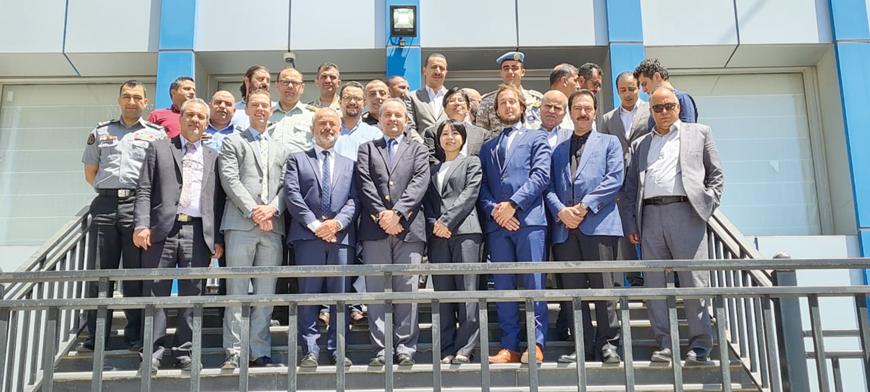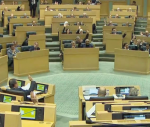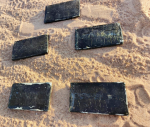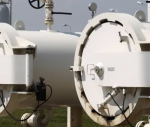You are here
IAEA mission sees ‘significant progress’ in Jordan’s regulatory safety framework
By JT - Oct 23,2017 - Last updated at Oct 23,2017
AMMAN — An International Atomic Energy Agency (IAEA) team of experts said Jordan significantly strengthened its regulatory framework for nuclear and radiation safety in recent years, according to a statement from the Energy and Minerals Regulatory Commission (EMRC) on Sunday.
Looking ahead, it noted that the regulator will continue to face human resources challenges as the country prepares for a nuclear power programme.
The Integrated Regulatory Review Service (IRRS) team on Sunday concluded an eight-day follow-up mission in Jordan to review its implementation of recommendations and suggestions made by a 2014 mission, the statement said.
The October 15-22 visit was conducted at the request of the Government and hosted by the Energy and EMRC, the national nuclear regulator.
Using IAEA safety standards and international best practices, IRRS missions are designed to strengthen the effectiveness of the national nuclear regulatory infrastructure, while recognising the responsibility of each country to ensure nuclear safety, the statement read.
The IRRS team said Jordan had effectively addressed the findings of the previous mission and made notable progress in enhancing its regulatory framework.
The EMRC either fully implemented all the recommendations and suggestions from 2014 or made considerable progress towards that goal, the experts said, according to the statement.
“This is a major achievement. The EMRC has shown commitment to continuously improving its regulatory practices,” team leader Nikolay Vlahov, head of the licensing of nuclear facilities division of Bulgaria’s Nuclear Regulatory Agency was quoted in the statement as saying.
Jordan uses radiation sources in medical and industrial applications as well as in science and research. Its first research and training reactor is expected to start operating soon.
Relying on imported fossil fuel for its energy needs, Jordan is among some 30 countries interested in introducing nuclear energy. It plans to build a nuclear power plant at the Amra site, about 70km east of the capital Amman, according to the statement.
“Maintaining and expanding staff competence and knowledge will be a continuous challenge as the number of radiation facilities is growing, a research reactor is close to start-up and a nuclear power plant is being considered,”Vlahov said.
The scope of the 2014 and the 2017 IRRS missions covered areas including: responsibilities and functions of the government and the EMRC; the global nuclear safety regime; the EMRC’s management system and activities, including authorisation, inspection, enforcement and the development of regulations and guides; emergency preparedness and response; occupational exposure control and patient protection; and the regulatory infrastructure being developed to support the introduction of a nuclear power programme.
The IRRS team said Jordan had taken several positive steps since the previous mission, including approval of a national policy and strategy for safety as well as a national policy for radioactive waste and spent nuclear fuel management. It has developed safety legislation which is awaiting final parliamentary approval, and regulations and instructions. The EMRC has also taken action to improve staffing levels and competencies and has enhanced emergency preparedness and response.
“Since 2014, the EMRC has made great efforts to meet IAEA safety standards and to improve the national safety infrastructure,” EMRC Chairman Farouq Al Hyari was quoted in the statement as saying. “These efforts for further enhancement will continue.”
The EMRC is responsible for all aspects of regulating radiation safety as well as nuclear safety and security in Jordan.
“It is further expanding its activities to address the regulation of the nuclear power programme while maintaining its focus on the safety of existing facilities and activities,” said IRRS team coordinator Hilaire Mansoux of the IAEA’s Division of Radiation, Transport and Waste Safety, in the statement.
The 11-member IRRS team comprised experts from Australia, Belgium, Bulgaria, Canada, Ireland, Lebanon, Pakistan, and Slovenia, as well as three IAEA staff members.
The final mission report will be provided to the government in about three months, which Jordan plans to make it public, according to the statement.
Related Articles
AMMAN — The International Atomic Energy Agency (IAEA) concluded evaluating the nuclear security system in Jordan through a team of specialis
AMMAN — The Energy and Minerals Regulatory Commission (EMRC) on Monday reaffirmed that the Jordan Research and Training Reactor at the Jorda
AMMAN — The Energy and Minerals Regulatory Commission (EMRC) on Sunday announced Jordan’s general policy in the field of nuclear safety and
















